
I hope everyone had a good Christmas and New Year. We certainly did. We have also discovered that local Devon Societies like their Christmas Dinners! We went to four last month with a further 1 planned this month. Diet is now very much on the agenda for January.
Diet is crucial in keeping our poultry fit and healthy during the winter months. Traditionally January and February has the most severe of the winter weather so keeping our poultry fit and happy in the damp and dark days can be quite a challenge.
Previous generations of poultry keepers did not have the availability of carefully formulated poultry diets. Remember the layers mash or pellets available at the local feed merchant provides all the nutrients our birds require. Keeping our poultry happy and healthy does involve more than basic dietary requirements. Here at Stable Green we ensure the birds have space, and an environment in which the birds can be happy and healthy. All types of poultry including waterfowl need a roost that is draft free, dry and well ventilated. You will easily know if you have a problem- the sheds will have a strong ammonia smell when you open the door in the morning. Poor ventilation is not helped by having wet or damp litter.
Our Northern hemisphere climate means that there is a high level of moisture in the air during the winter. So floor litter can quickly become damp and compacted. Our field sheds are all raised above ground so that the air circulates underneath helping to keep the floors dry. We also have to clean out much more often as the shavings absorb water from the air and can become damp really quickly sometimes within a week or so in very wet weather. We give the poultry a grain scratch feed an hour before dusk. This keeps the birds interested and will turn the litter over helping to keep it dry and friable. Plus when available they a few carrots to peck and enjoy every day.
Carry on concreting!
This story is from the {{IssueName}} edition of {{MagazineName}}.
Start your 7-day Magzter GOLD free trial to access thousands of curated premium stories, and 9,000+ magazines and newspapers.
Already a subscriber ? Sign In
This story is from the {{IssueName}} edition of {{MagazineName}}.
Start your 7-day Magzter GOLD free trial to access thousands of curated premium stories, and 9,000+ magazines and newspapers.
Already a subscriber? Sign In
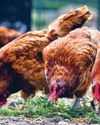
Growing food for Chickens
Mary Larham explores some crops to grow on your holding…
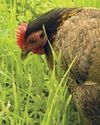
Poultry in the garden – the truth!
Jo-Jane Buxton shares her experiences

The British Waterfowl Association
Which came first, the goose or the egg?

WHY FIT A FAN IN AN INCUBATOR?
Brinsea Products, the Incubation Specialists explain the difference between still air and forced draught
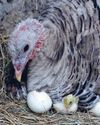
Incubating turkey eggs
Janice Houghton-Wallace looks at broody turkeys and artificial incubation

Chicken nesting box herbs
Diana Clauss owns The Blue Feather Farm, in St Cloud, Florida, home to chickens, ducks, goats, and Anatolian Shepherd dogs.
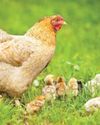
Incubate in January?
Jessica Wombwell says plan the breeding
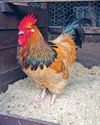
Andy's DIARY
Andy emphases the importance of keeping out damp and wet but allowing ventilation even in cold weather
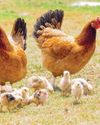
Feeding for Breeding
It may be winter, but as Joanna Palmer, nutritionist for Smallholder Range explains, now’s the time to get your flock in tiptop shape and plan ahead for a successful breeding season next spring.
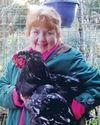
A chick named Cuckoo raised by a duck!
Chris Hammacott and her husband live on a small croft in the Outer Hebrides, they keep a ‘no kill’ flock or rare and rescue sheep which they use to spin and weave rugs. They also share the 8 acres with hens, ducks, cats and 9 rescue pugs.